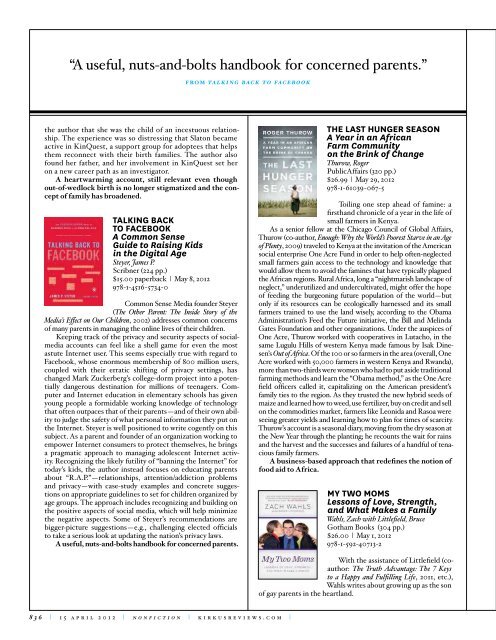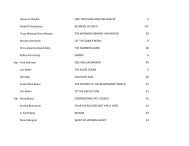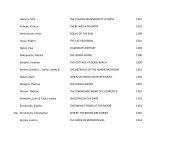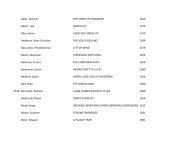nonfiction
nonfiction
nonfiction
You also want an ePaper? Increase the reach of your titles
YUMPU automatically turns print PDFs into web optimized ePapers that Google loves.
“A useful, nuts-and-bolts handbook for concerned parents.”<br />
from talking back to facebook<br />
the author that she was the child of an incestuous relationship.<br />
The experience was so distressing that Slaton became<br />
active in KinQuest, a support group for adoptees that helps<br />
them reconnect with their birth families. The author also<br />
found her father, and her involvement in KinQuest set her<br />
on a new career path as an investigator.<br />
A heartwarming account, still relevant even though<br />
out-of-wedlock birth is no longer stigmatized and the concept<br />
of family has broadened.<br />
TALKING BACK<br />
TO FACEBOOK<br />
A Common Sense<br />
Guide to Raising Kids<br />
in the Digital Age<br />
Steyer, James P.<br />
Scribner (224 pp.)<br />
$15.00 paperback | May 8, 2012<br />
978-1-4516-5734-0<br />
Common Sense Media founder Steyer<br />
(The Other Parent: The Inside Story of the<br />
Media’s Effect on Our Children, 2002) addresses common concerns<br />
of many parents in managing the online lives of their children.<br />
Keeping track of the privacy and security aspects of socialmedia<br />
accounts can feel like a shell game for even the most<br />
astute Internet user. This seems especially true with regard to<br />
Facebook, whose enormous membership of 800 million users,<br />
coupled with their erratic shifting of privacy settings, has<br />
changed Mark Zuckerberg’s college-dorm project into a potentially<br />
dangerous destination for millions of teenagers. Computer<br />
and Internet education in elementary schools has given<br />
young people a formidable working knowledge of technology<br />
that often outpaces that of their parents—and of their own ability<br />
to judge the safety of what personal information they put on<br />
the Internet. Steyer is well positioned to write cogently on this<br />
subject. As a parent and founder of an organization working to<br />
empower Internet consumers to protect themselves, he brings<br />
a pragmatic approach to managing adolescent Internet activity.<br />
Recognizing the likely futility of “banning the Internet” for<br />
today’s kids, the author instead focuses on educating parents<br />
about “R.A.P.”—relationships, attention/addiction problems<br />
and privacy—with case-study examples and concrete suggestions<br />
on appropriate guidelines to set for children organized by<br />
age groups. The approach includes recognizing and building on<br />
the positive aspects of social media, which will help minimize<br />
the negative aspects. Some of Steyer’s recommendations are<br />
bigger-picture suggestions—e.g., challenging elected officials<br />
to take a serious look at updating the nation’s privacy laws.<br />
A useful, nuts-and-bolts handbook for concerned parents.<br />
THE LAST HUNGER SEASON<br />
A Year in an African<br />
Farm Community<br />
on the Brink of Change<br />
Thurow, Roger<br />
PublicAffairs (320 pp.)<br />
$26.99 | May 29, 2012<br />
978-1-61039-067-5<br />
Toiling one step ahead of famine: a<br />
firsthand chronicle of a year in the life of<br />
small farmers in Kenya.<br />
As a senior fellow at the Chicago Council of Global Affairs,<br />
Thurow (co-author, Enough: Why the World’s Poorest Starve in an Age<br />
of Plenty, 2009) traveled to Kenya at the invitation of the American<br />
social enterprise One Acre Fund in order to help often-neglected<br />
small farmers gain access to the technology and knowledge that<br />
would allow them to avoid the famines that have typically plagued<br />
the African regions. Rural Africa, long a “nightmarish landscape of<br />
neglect,” underutilized and undercultivated, might offer the hope<br />
of feeding the burgeoning future population of the world—but<br />
only if its resources can be ecologically harnessed and its small<br />
farmers trained to use the land wisely, according to the Obama<br />
Administration’s Feed the Future initiative, the Bill and Melinda<br />
Gates Foundation and other organizations. Under the auspices of<br />
One Acre, Thurow worked with cooperatives in Lutacho, in the<br />
same Lugulu Hills of western Kenya made famous by Isak Dinesen’s<br />
Out of Africa. Of the 100 or so farmers in the area (overall, One<br />
Acre worked with 50,000 farmers in western Kenya and Rwanda),<br />
more than two-thirds were women who had to put aside traditional<br />
farming methods and learn the “Obama method,” as the One Acre<br />
field officers called it, capitalizing on the American president’s<br />
family ties to the region. As they trusted the new hybrid seeds of<br />
maize and learned how to weed, use fertilizer, buy on credit and sell<br />
on the commodities market, farmers like Leonida and Rasoa were<br />
seeing greater yields and learning how to plan for times of scarcity.<br />
Thurow’s account is a seasonal diary, moving from the dry season at<br />
the New Year through the planting; he recounts the wait for rains<br />
and the harvest and the successes and failures of a handful of tenacious<br />
family farmers.<br />
A business-based approach that redefines the notion of<br />
food aid to Africa.<br />
MY TWO MOMS<br />
Lessons of Love, Strength,<br />
and What Makes a Family<br />
Wahls, Zach with Littlefield, Bruce<br />
Gotham Books (304 pp.)<br />
$26.00 | May 1, 2012<br />
978-1-592-40713-2<br />
With the assistance of Littlefield (coauthor:<br />
The Truth Advantage: The 7 Keys<br />
to a Happy and Fulfilling Life, 2011, etc.),<br />
Wahls writes about growing up as the son<br />
of gay parents in the heartland.<br />
In January 2011, the author, then a student at the University<br />
of Iowa, testified before the Iowa House Judiciary Committee<br />
as they considered a state constitutional amendment to ban<br />
same-sex marriage. In a short speech, Wahls talked about being<br />
raised by two lesbians and how his childhood was no different<br />
than those of children raised by heterosexual couples. The<br />
speech was aimed at dismantling the myth that kids are damaged<br />
by having gay parents, and it was effective: The YouTube<br />
video of the speech was viewed more than 18 million times,<br />
and Wahls appeared on national TV talk shows, including The<br />
Ellen DeGeneres Show. Here the author expands on his speech,<br />
discussing the values that his parents helped to instill in him,<br />
naming chapters after aspects of the Boy Scout law: “Trustworthy,”<br />
“Courteous,” “Reverent.” (Wahls takes pride in his<br />
scouting experience, repeatedly mentioning that he is an Eagle<br />
Scout, but he disagrees with the Boy Scouts of America’s official<br />
policy banning gays from leadership positions.) Some of the<br />
author’s stories are quite moving—particularly those addressing<br />
his mother Terry’s multiple sclerosis—but many of Wahls’<br />
epiphanies are unsurprising: “We are more alike than we are different”;<br />
“hate has no hope of ever erasing hate”; etc. The book<br />
works best when there’s more levity amidst the earnestness, as<br />
when the author humorously answers questions he’s asked most<br />
frequently (e.g., “Which one of your moms is the man”). Few<br />
minds will be changed by this book—it seems unlikely that a<br />
homophobe would read something titled My Two Moms—but<br />
Wahls’ heart is in the right place.<br />
A sincere first effort that aims to chip away at stereotypes<br />
surrounding same-sex parents.<br />
WAGING WAR ON<br />
THE AUTISTIC CHILD<br />
The Arizona 5 and<br />
the Legacy of Baron<br />
von Munchausen<br />
Wakefield, Andrew J.<br />
Skyhorse Publishing (272 pp.)<br />
$26.95 | Jun. 1, 2012<br />
978-1-61608-614-5<br />
Wakefield (Callous Disregard: Autisms<br />
and Vaccines: The Truth Behind a Tragedy,<br />
2010), a British gastroenterologist who was stricken from the<br />
British medical register in 2010, defends himself against the<br />
charges brought against him.<br />
In 1998, the author published a research study that claimed to<br />
have established a link between the measles, mumps and rubella<br />
vaccination (MMR) and gastrointestinal disease and autism spectrum<br />
disorder. Accused of falsifying the data, he was subsequently<br />
barred from practicing medicine in the U.K. He begins this book<br />
with a spirited attack against the Sunday Times reporter, Brian Deer,<br />
who first exposed him in a series of articles. Wakefield brought an<br />
unsuccessful libel suit against the journalist, but he continues his<br />
attack on Deer, Times publisher Rupert Murdoch and the pharmaceutical<br />
companies that produce vaccines. The ostensible occasion<br />
for this sequel to his 2011 book on the same subject is a dispute<br />
between Arizona parents and child-welfare authorities. The author<br />
writes in defense of the parents, who were accused of child abuse<br />
when they repeatedly sought medical services at Phoenix Children’s<br />
Hospital for their five children. The parents claimed that<br />
their children were suffering from developmental disabilities and<br />
gastrointestinal problems that resulted from vaccinations they had<br />
received. Wakefield writes that the doctors who treated the children,<br />
“supported by hospital psychologists, bureaucrats, and litigators…believed<br />
that the children were healthy but abused,” and<br />
that the parents were seeking attention—the so-called “Munchausen<br />
Syndrome by Proxy.” The parents were accused of fabricating<br />
information and refusing to have their children properly vaccinated,<br />
and the children were temporarily removed by Arizona<br />
child-welfare authorities to foster care.<br />
The jury is still out on the causes and best treatment of<br />
autism spectrum disorder, but readers will find it difficult<br />
to disentangle the author’s efforts at self-rehabilitation<br />
from his contentions that this family was treated unjustly.<br />
THE HARM IN HATE SPEECH<br />
Waldron, Jeremy<br />
Harvard Univ. (264 pp.)<br />
$26.95 | May 23, 2012<br />
978-0-674-06589-5<br />
A vigorously argued, intelligent challenge<br />
to the “liberal bravado” of U.S. First<br />
Amendment scholars.<br />
In an eloquent reply to free-speech<br />
advocates, Waldron (New York University<br />
School of Law; Torture, Terror, and<br />
Trade-Offs: Philosophy for the White House, 2010, etc.) moves step<br />
by step in building the argument as to why hate-speech laws are<br />
good for a well-ordered society. In many enlightened democracies<br />
in Europe, as well as in Canada, the use of threatening,<br />
abusive speech or behavior to stir up racial hatred is prohibited<br />
by law. Americans, on the other hand, are vociferously more<br />
guarded about the First Amendment, and the Supreme Court<br />
has opposed regulation on free speech only since 1931, when<br />
it struck down a California law forbidding the display of a red<br />
flag as an oppositional symbol. Subsequently, the government,<br />
Christian Church and public officials were deemed sufficiently<br />
strong enough not to need regulation of attacks on them, while<br />
even the Ku Klux Klan could indulge in hate speech “unless<br />
it is calculated to incite or likely to produce imminent lawless<br />
action.” But racial and ethnic minorities are vulnerable, Waldron<br />
writes, and a liberal democracy’s “assurance” of their protection<br />
from attack and denigration are not secure when hate<br />
speech is allowed free rein, such as in the time of public hysteria<br />
after 9/11. The author argues that the damage caused by hate<br />
speech is like an “environmental threat to social peace, a sort<br />
of slow-acting poison” that robs the intended victims of their<br />
dignity and reputation in society. Waldron’s analogy between<br />
hate speech and pornography—in terms of the defamation of<br />
women—is particularly noteworthy. He responds carefully to<br />
the notion of free speech as a necessary part of democracy’s<br />
836 | 15 april 2012 | <strong>nonfiction</strong> | kirkusreviews.com |<br />
| kirkusreviews.com | <strong>nonfiction</strong> | 15 april 2012 | 837






